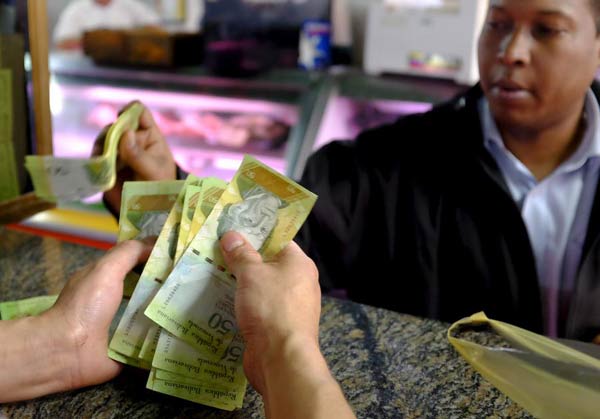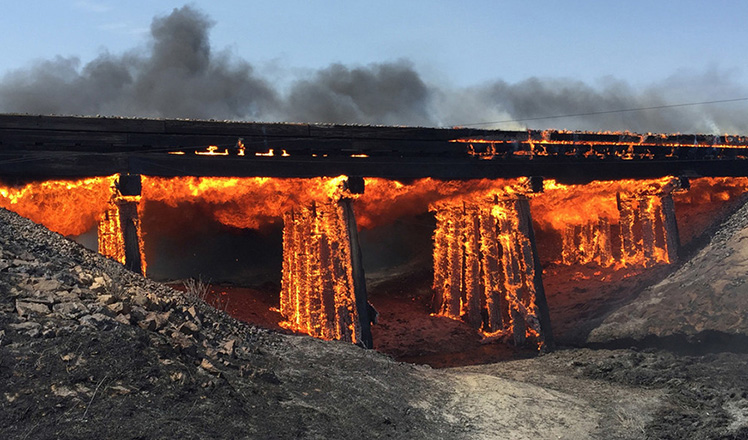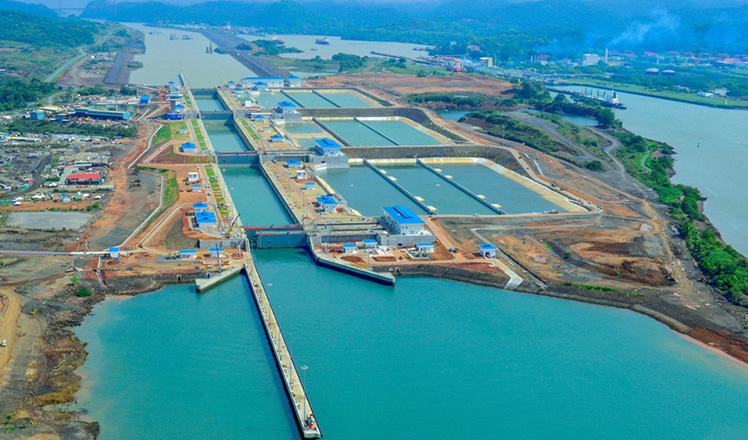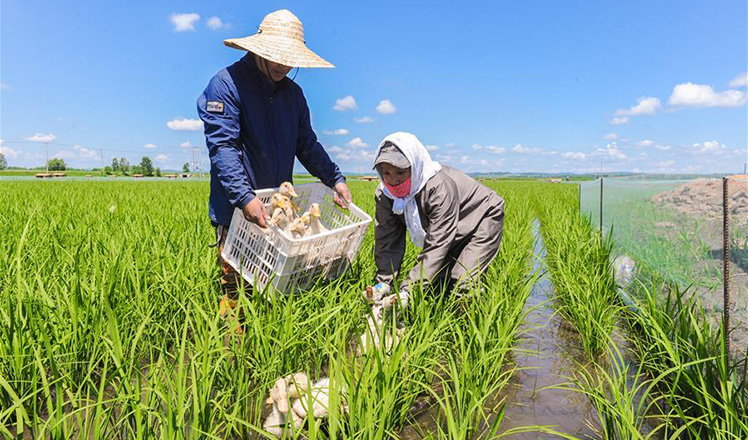Loans to Venezuela are relatively safe
Updated: 2016-06-28 08:21
By MEI XINYU(China Daily)
|
||||||||
 |
|
A cashier counts bolivar notes at a butchery in a public market in Caracas, Venezuela January 22, 2016. [Photo/Agencies] |
With Venezuela facing a deep economic crisis and political stalemate, Beijing's loans to Caracas have become a heated topic of discussion at home and abroad, especially after the Western media reported that China recently sent an "unofficial envoy" to meet with Venezuela's opposition party. Such reports are not confirmed by Chinese Foreign Ministry.
Some Western media outlets interpreted this as China's attempt to curry favor with Venezuela's opposition to ensure its loans to the country are recognized even if President Nicolas Maduro steps down. This perception is wrong.
Since China adheres to the principle of non-interference in other countries' internal affairs, it will continue its mutually beneficial cooperation with Venezuela on the basis of the Five Principles of Peaceful Coexistence no matter which political party is in power. Also, there is no reason for a Venezuela ruled by a certain political party not to deal with foreign creditors, especially China, its largest foreign creditor.
The debt problem Venezuela faces is a result of its liquidity crisis, not solvency crisis. This means the huge loans China has given to Venezuela, contrary to what some claim, are retrievable. Besides, Venezuela's abundant resources and China's comprehensive national strength are enough to ensure the long-term safety of these loans.
Indeed, Venezuela now lacks the capability to repay foreign loans. By the end of September 2015, its foreign debt had reached $148.83 billion, of which $65 billion were loans it had taken from China since 2005. Compounding the problem is the fact that Venezuela has only $15.6 billion in foreign exchange reserves.
But Venezuela has an explored oil reserve of 297.7 billion barrels, the largest in the world. It also has a colossal confirmed reserves of natural gas, iron ore, coal, bauxite, limestone, nickel, gold, diamond and uranium. It is also rich in hydro-power and forest resources, with its forest coverage rate being 56 percent. Such abundant natural resources mean Venezuela is more than capable of repaying its foreign debts despite the continuation of the liquidity crisis.
As one of the world's leading oil importers, China's loans can indeed help Venezuela maintain normal oil production and prevent oil prices from increasing. With a daily oil output of 2.9 million barrels and export of 2.33 million barrels, any indication of Venezuela suspending production will send oil prices soaring.
But believing its credit assets in Venezuela are safe in the long term does not mean China should not make some proactive arrangements. To begin with, China should help the Venezuelan government to get the approval of its opposition-dominated parliament for its debt restructuring, in order to gain political guarantee for the safety of its assets in the country. And since the Venezuelan government, not its ruling United Socialist Party, took the loans from China, the succeeding government will be obliged to repay them.
But China has to specify that some of its loans to Venezuela are meant for the latter to maintain oil and gas production and exports, and promote the formulation of some corresponding management methods. Under pressure to repay the principal and interest amounts for its imports and matured debts, Venezuela has used a very small part of its oil export revenue to maintain oil production and transport facilities. So, to ensure Venezuela's largest source of fiscal revenue is not interrupted and prevent a lose-lose scenario for both creditor and debtor, it is necessary for China to specify that some of its loans are meant for Venezuela's oil production and export.
With the deepening of its economic and social crisis, Venezuela is likely to grant foreign capital, including Chinese capital, access its oil and gas production and transport to help create favorable conditions for possible debt-to-equity deals with China, its largest creditor.
The author is a researcher at the International Trade and Economic Cooperation Institute of the Ministry of Commerce.
- Hillary Clinton boasts double-digit lead over Trump: poll
- First New York Pride March since Orlando shooting targets gun control
- Intl experts question proceedings of South China Sea arbitration
- South China Sea tribunal has no legal validity
- Cambodia positions itself along new Silk Road: media
- UK opposition leader Corbyn says will not resign after Brexit vote

 The world in photos: June 20-26
The world in photos: June 20-26
 Panama Canal opens with Chinese ship making first passage
Panama Canal opens with Chinese ship making first passage
 Eco-friendly farming system introduced to NE China
Eco-friendly farming system introduced to NE China
 UK votes to LEAVE the EU in historic referendum
UK votes to LEAVE the EU in historic referendum
 Aussie Ben Simmons picked by 76ers as No 1 in NBA Draft
Aussie Ben Simmons picked by 76ers as No 1 in NBA Draft
 Ancient scroll's digital art show staged in Beijing airport
Ancient scroll's digital art show staged in Beijing airport
 University students go underwater to celebrate graduation
University students go underwater to celebrate graduation
 Ten photos from around China: June 17 - 23
Ten photos from around China: June 17 - 23
Most Viewed
Editor's Picks

|

|

|

|

|

|
Today's Top News
Abe's blame game reveals his policies failing to get results
Ending wildlife trafficking must be policy priority in Asia
Effects of supply-side reform take time to be seen
Chinese State Councilor Yang Jiechi to meet Kerry
Chinese stocks surge on back of MSCI rumors
Liang avoids jail in shooting death
China's finance minister addresses ratings downgrade
Duke alumni visit Chinese Embassy
US Weekly

|

|









